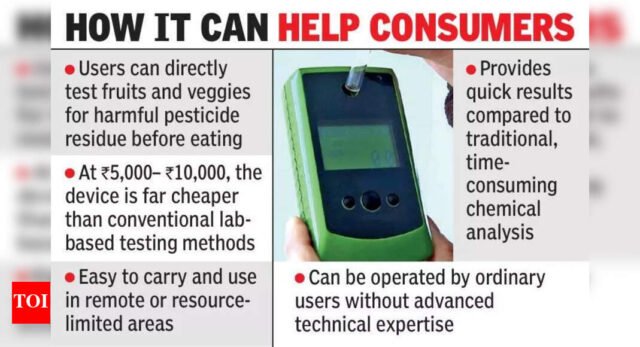Hyderabad: Researchers at the Birla Institute of Technology and Science (BITS) Pilani, Hyderabad, developed a new, compact, and portable device that enables on-site pesticide detection for safer food consumption.Developed in collaboration with UiT – The Arctic University of Norway, the chemiluminometer can detect harmful pesticide residues on fruits and vegetables directly at the source. It works by leveraging the principle of chemiluminescence (CL), a chemical reaction that produces light. The research was published in Microchemical Journal.“Our device works as a portable chemiluminometer. All one has to do is wash a fruit or vegetable and give the same water as input. When this water reacts with the reagent, light is given as output, indicating the presence of pesticide. It can be carried anywhere, even to markets, to test if a product contains pesticides or not,” said Pavar Sai Kumar, senior research associate from BITS. He said that the entire device costs about Rs 5000 to Rs 10,000.Researchers said that based on the intensity of light, the concentration of pesticides can be measured. They pointed out that conventional methods for detecting these chemicals are often complex, time-consuming, expensive, and require a specialised lab and trained technicians.“This new device bypasses these limitations by providing an easy-to-use solution for on-site testing, even in remote or resource-limited areas,” he added.The device uses a test strip (a microfluidic paper-based analytical device or µPAD), which is nothing but a filter paper with a reagent on it. The portable system also consists of a high-resolution camera and an integrated microcontroller used to analyse this signal to provide a quantitative result.“We’ve tested the device for pesticides on fruits and vegetables. Our goal is to apply this technology to a broader range of food safety issues, including food adulteration and biomarker detection,” said Reshma PA, a PhD scholar. She notes that the platform’s ability to be chemically adapted allows it to test for multiple substances, including oils and millets.MSID:: 124050313 413 |







